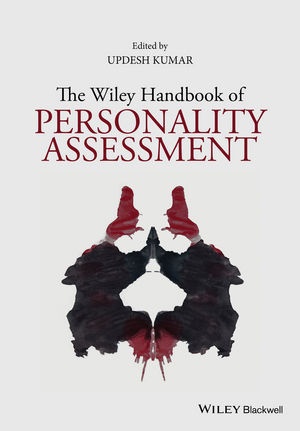Read more
Informationen zum Autor Updesh Kumar is Scientist 'G' and Head of the Mental Health Division at the Defense Institute of Psychological Research (DIPR) for the Indian Government. His publications include Suicidal Behaviour: Assessment of People-at-Risk (2010); Countering Terrorism: Psychosocial Strategies (2012); Understanding Suicide Terrorism: Psychosocial Dynamics (2014); Suicidal Behaviour: Underlying Dynamics (2015); Positive Psychology: Applications in Work, Health and Well-being (2015) and The Routledge International Handbook of Psychosocial Resilience (in press). In 2013, he was awarded the DRDO's Scientist of the Year Award by the Indian Government. Klappentext The Wiley Handbook of Personality Assessment presents the state-of-the-art in the field of personality assessment, providing a perspective on emerging trends, and placing these in the context of research advances in the associated fields.* Explores emerging trends and perspectives in personality assessment, building on current knowledge and looking ahead to the future landscape of the field* Discusses emerging technologies and how these can be combined with psychological theories in order to enhance the real-world practice of assessing personality* Comprehensive sections address gaps in current knowledge and collate contributions and advances from diverse areas and perspectives* The chapter authors are eminent scholars from across the globe who bring together new research from many different countries and cultures Zusammenfassung The Wiley Handbook of Personality Assessment presents the state-of-the-art in the field of personality assessment, providing a perspective on emerging trends, and placing these in the context of research advances in the associated fields. Inhaltsverzeichnis About the Editor x About the Contributors xii Foreword by Professor Irving B. Weiner xxxi Preface xxxiii Section I Emerging Conceptual Trends 1 1 Integrating Trait and Process Approaches to Personality: A Sketch of an Agenda 3 Robert R. McCrae 2 Personality Assessment and Theory 19 Philip J. Corr and Arthur E. Poropat 3 Situational Perception: Its Theoretical Foundation, Assessment, and Links to Personality 31 Kai T. Horstmann and Matthias Ziegler 4 Temperamental Components of the Developing Personality 44 James B. Victor, Mary K. Rothbart, Spencer R. Baker, and Jennifer L. Tackett 5 Integrity Tests: A Review of Alternate Conceptualizations and Some Measurement and Practical Issues 59 Chockalingam Viswesvaran and Deniz S. Ones 6 Network Analysis: A New Way to Think about Personality 74 Giulio Costantini and Marco Perugini 7 Theory and Measurement of Trait Emotional Intelligence 90 K.V. Petrides, Alexander B. Siegling, and Donald H. Saklofske 8 Beyond IQ and EQ: The Bar¿On Multifactor Model of Performance 104 Reuven Bar¿On 9 Measuring the Dark Side of Personality 119 Ashton C. Southard and Virgil Zeigler¿Hill 10 Diversity and Assessment 134 Joyce P. Chu, Brian A. Maruyama, Ashley Elefant, and Bruce Bongar 11 Future Directions for Personality Assessment: An African Perspective 146 Sumaya Laher 12 Advances in the Use and Interpretation of the MMPI¿2 158 Salazar¿Schneiderman, Caroline S. Tonetti, Lacey M. Sommers, and Roger L. Greene Section II Emerging Assessment Perspectives and Methodological Issues 173 13 Objective Personality Assessment with the MMPI¿2: An Internationally Adaptable Measure 175 James N. Butcher 14 Precision Assessment: An Individualized and Temporally Dynamic Approach to Understanding Patients in their Daily Lives 192 Michael J. Roche and Aaron L. Pincus 15...

